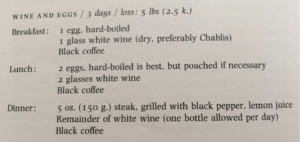Fad diets have a bad reputation — for many more reasons than what they can do to your gut’s microbiome.
Lots of them forego essential nutrition for the sake of weight loss. Think about low-carb diets.
Lots of them are obviously ill-advised now, but at one point were taken seriously. Like this fad diet found in Vogue magazine in the 1970s.

Lots of them serve their primary purpose — weight loss — but require permanent adherence, or all of the weight comes back. Think about the Whole30 diet.
But what we should be focusing on isn’t whether or not you kept those last five pounds off. What we should be focusing on is whether those diets are keeping the flora of your gut healthy and diverse. After all, without a healthy gut, we know all kinds of things can go wrong.
Things like:
- Fatigue
- Anxiety or depression
- Acid reflux
- Indigestion
- Weight fluctuations
- Headaches and brain fog
- Salt or sugar cravings
- Skin rashes
And so much more. In this post, we’re going to explore the effects that three popular fad diets have on your living and thriving gut.
The Paleo Diet
If you’re unfamiliar, the paleo diet is also sometimes referred to as “The Caveman Diet.” You eat meat, vegetables, and nuts. But you avoid grains, legumes, refined sugar, and dairy. Essentially, you cannot eat anything a caveman would not have had access to.
According to a recent study published in the European Journal of Nutrition, excluding grain from your diet resulted in exceedingly high levels of trimethylamine-n-oxide (TMAO) in the gut’s microbiome.
The suggestion is that consuming whole grains suppresses the bad bacteria that TMAO produce. This is because whole grains are a source of resistant starch and fermentable fibers — both of which are marvelous for the microbiome.
By eliminating whole grains, participants in the study both showed lower, and in some cases almost non-existent, levels of two crucial bacteria: bifidobacteria and roseburia. Both bacteria serve to maintain an intestinal barrier to prevent leaky gut syndrome, promote anti-inflammatory microbes, stimulate hormone release, regulate the immune system, and impact mood.
Bottom line? No harm can come from cutting refined sugars and, some say, dairy. But whole grains are not to be toyed with.
The Keto Diet
This is like the Atkins Diet 2.0 — cut carbs! The idea is that if you reduce your carb intake, your body will be forced to burn fat — a condition known as ketosis.
However, evidence is recently rising to the surface suggesting that keto’s emphasis on high-fat food and insistence on low-carb intake can actually affect the performance of the good bacteria in your gut.
Almost all of your behavior can influence the culture of your microbiome. A recent study completed in China tested various levels of fat and carbohydrate consumption, and the results were rather interesting.
For example, the group with the lower-fat diet experienced an increase in gut bacteria responsible for lowering cholesterol. The opposite was true for the higher-fat diet subjects. In fact, the higher-fat diet subjects also experienced changed in long chain fatty acid metabolism, allowing for the expansion of chemicals that trigger inflammation.
Some studies have even found that the keto diet increase the mucus-degrading bacterium in the gut.
Bottom line? High-fat diets aren’t the answer either, it turns out.
The Mediterranean Diet
This diet doesn’t have the same name-recognition as the others mentioned, perhaps because it’s only gained real traction in the last few years. It consists mainly of fruits, vegetables, whole grains, nuts, fish, and poultry. The diet’s been linked to all kinds of health benefits: lowered risk of prostate cancer, heart health, diabetes prevention and management, and more.
A new study from the Wake Forest Baptist Medical Center in North Carolina suggests that it can also increase good gut bacteria.
Tested in monkeys over 30 months, the Mediterranean diet increased lactobacillus — a friendly bacteria preventing and treating digestive conditions — by about 7%. That particular bacteria can be found in fermented foods as well.
Subjects were also found to have higher levels of faecal short-chain fatty acids. And because the Mediterranean diet focuses so heavily on fiber, which feeds healthy bacteria in the gut, participants in the study were found to have robust populations of healthy bacteria.
Additionally, olive oil continues to be shown to decrease internal inflammation, like the kind that causes IBS.
Bottom line? This diet’s focus on vegetables, fibrous, fermented, and whole grain foods has positive effects on the microbiome.
Trusting a fad diet is almost always a bad idea. Mainly because they promote restriction, or the removal of one element from the diet — carbs, red meat, sugar, grain. The microbiome thrives on diversity, and in moderation of high-fat foods.
You don’t even have to select a diet, really. Just eat with your gut in mind!
You might want to also consider taking a daily probiotic supplement to support your gut health. Our favorite is Just Thrive Probiotic.
You May Also Like…




